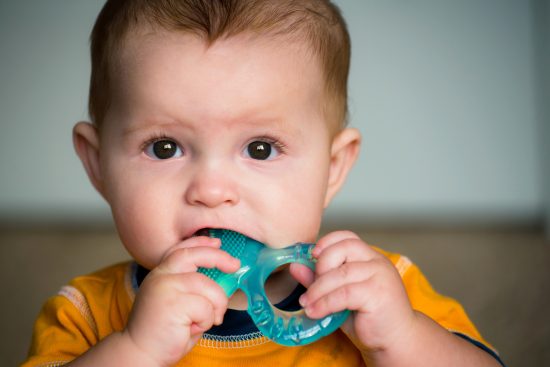They’re down in the dumps and in pain with those pesky teeth that are trying desperately to get through. Here we look at easy methods to help soothe your baby’s sore gums.
Parents, grandparents, friends all have their teething tips, but what actually works? We share some easy things that research has found to be most effective.
One study of 270 babies between 8 and 36 months suggested that a solid plastic ring that your baby can chew down on might provide the most relief compared with the other methods researchers tested.
The science is that pushing down on a teether provides counter-pressure to a rising tooth. This method is widely recommended and reported to work, especially chilled objects.

So what do I do?
Either buy a teething toy or use a safe household object, such as your baby’s weaning spoon. You might even have a teether attached to one of their toys already. Never tie a toy around your baby’s neck, as it may be a choking hazard.
Read our detailed guide to teething toys here.

Other than being the nicest name for a therapy ever, cuddling gains second spot for how to ease teething pain.
So what do I do?
Other than the obvious, like cuddling them when they are distressed or feeling discomfort, just be there for them and distract them. Try distracting them with playing, singing and reading for example.
This light massage technique gains third spot and is widely recommended. And what’s great about this is all you need is a clean fingertip.
So what do I do?
Use a clean fingertip or very soft finger toothbrush to lightly massage your little one’s gums for one to two minutes. Perhaps try small circular motions.
In fourth place is a cube of ice wrapped up in something for soothing those emerging pearly whites.

So what do I do?
While some parents we know try this method and report good results, do approach it with caution. The NHS says to never put a teething ring in the freezer because it could damage your baby’s gums.
Watch your baby carefully to make sure it isn’t too cold for them (prompting even more grizzles). If it is, try a chilled teether instead.
Last was using food to chew on to ease their pain. That’s not to say it wasn’t effective – half of parents in the study still reported it as completely or moderately effective, so it’s certainly worth raiding the kitchen and giving it a shot. This is also something the NHS recommends.
It’s important you only use solid foods if your baby is over six months old and you stay with them
So what do I do?
It’s really important you only use solid foods if your baby is over six months old and you are staying with them to ensure they don’t choke.
The babies in the study were given small pieces of a frozen fruit or vegetable, like banana, apple or cucumber, to chew on under the watchful eye of parents. However, the NHS advises against using frozen items. Instead try a piece of chilled apple, carrot or melon, a crust of bread or a breadstick.
To read more about feeding and teething, see our article here.
There’s a lack of evidence that these work.
However, your pharmacist might recommend sugar-free pain relievers like paracetamol or ibuprofen if your child is over three months old.
For more suggestions, see this article. Different things will work for different babies so give them give them a try and see what works for your little one. Good luck.
Our support line offers practical and emotional support with feeding your baby: 0300 330 0700.
You might find attending one of NCT’s Early Days groups helpful as they give you the opportunity to explore different approaches to important parenting issues with a qualified group leader and other new parents in your area.
Make friends with other parents-to-be and new parents in your local area for support and friendship by seeing what NCT activities are happening nearby.
NCT has partnered with Mini First Aid to offer courses in baby first aid.